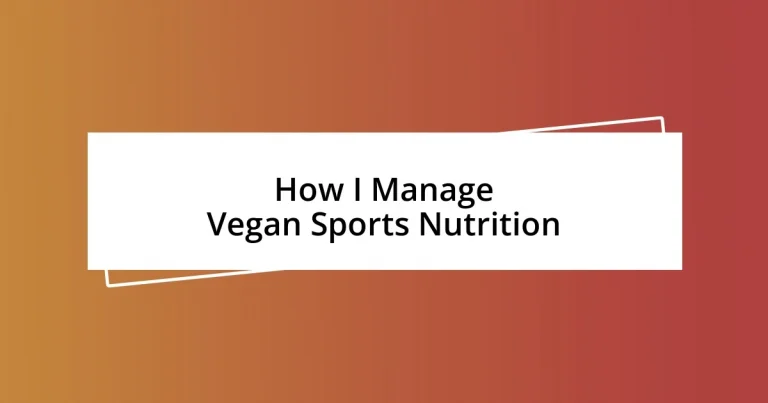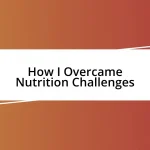Key takeaways:
- Vegan athletes must prioritize key nutrients such as protein, iron, and B12 to enhance performance and recovery.
- Meal planning is essential; it helps maintain a balanced diet and reduces post-workout meal stress.
- Incorporating hydrating foods and strategic supplementation can significantly improve hydration and overall energy levels during workouts.
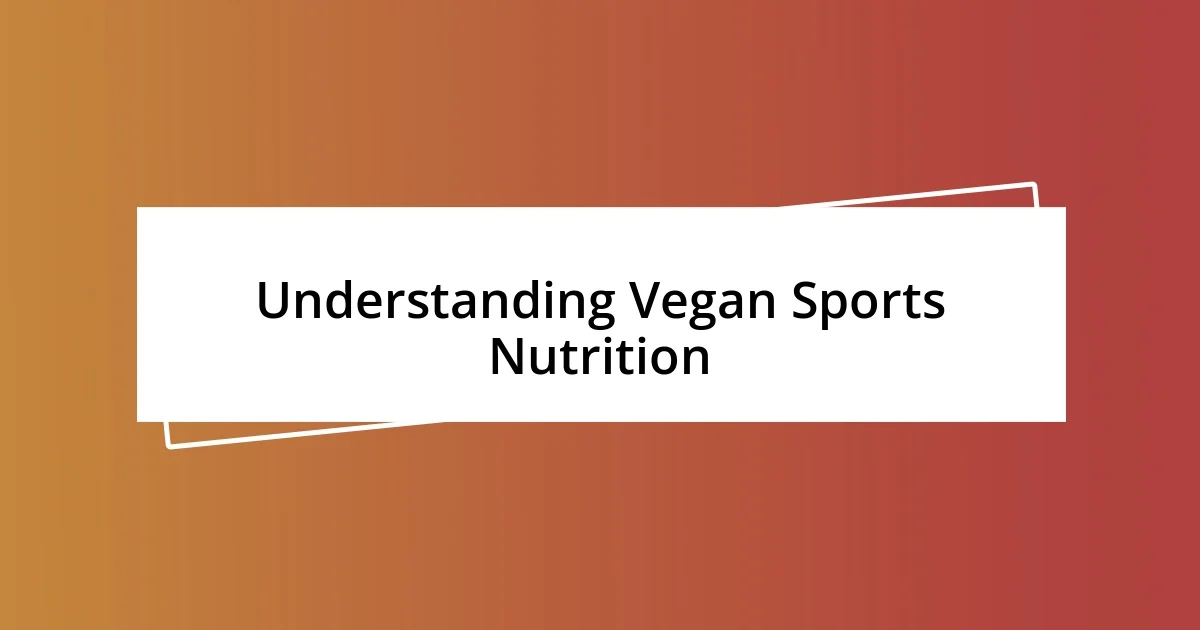
Understanding Vegan Sports Nutrition
Vegan sports nutrition might seem straightforward, but it’s truly an art form. I remember when I first transitioned to a plant-based diet while training for a marathon. It felt overwhelming at times—what do you eat for energy? Where do you get your protein? But I soon learned that a variety of whole foods like legumes, nuts, and grains could fuel my body just as well as animal products.
A crucial aspect to understand is that vegan athletes need to be mindful about their nutrient intake, especially protein, iron, and B12. I often found myself stacking my plates with quinoa, lentils, and dark leafy greens to ensure I hit my targets, and let me tell you, the colorful meals became a source of joy rather than a chore. Have you ever felt the satisfaction of whipping up a vibrant veggie stir-fry? It’s not just about what you eat; it’s about the experience and connection to your food.
What struck me the most was how my energy levels improved once I understood the importance of balanced meals. After a tough workout, a smoothie packed with spinach, bananas, and plant-based protein became my go-to. It wasn’t just delicious; it was a delightful reward that replenished my body and spirit. How can something so nutritious also feel like a treat? That’s the magic of vegan sports nutrition—it transforms health into a delicious lifestyle.
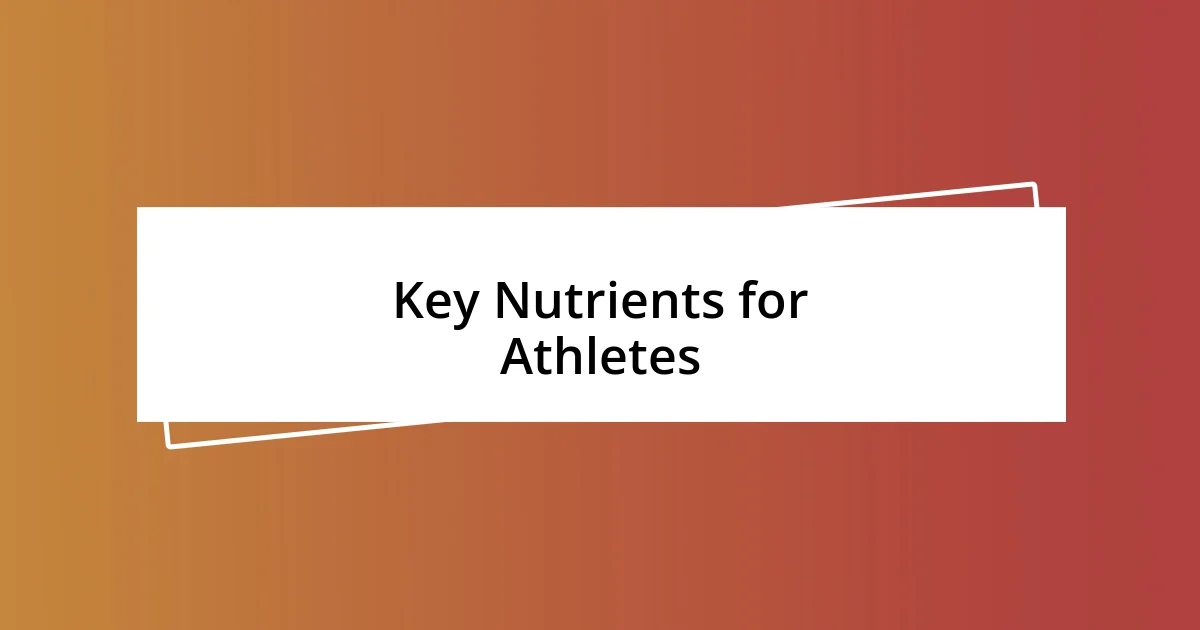
Key Nutrients for Athletes
Key nutrients are vital in any athlete’s diet, but they take on a unique significance for those of us pursuing a vegan lifestyle. I can’t stress enough the importance of protein—it’s not just about muscle repair; it’s about sustained energy. For example, I often enjoy a hearty black bean chili after training sessions, packed with protein and fiber, which helps me feel full and energized for longer. In my experience, incorporating a mix of legumes, tofu, and tempeh ensures I’m getting a diverse amino acid profile that fuels my workouts and recovery.
Another critical nutrient for athletes is iron, which can sometimes be a concern on a vegan diet. When I first discovered I was low in iron, I felt a hefty drop in my performance. I quickly learned to include more iron-rich foods like chickpeas and fortified cereals in my meals, while also pairing them with vitamin C sources, like bell peppers, to enhance absorption. The change was noticeable—I felt stronger and more capable during my runs, which in turn boosted my overall confidence.
Vitamins, especially B12, cannot be overlooked. It’s common for us plant-based athletes to overlook their need for this essential vitamin since it’s primarily found in animal products. Early on, I started taking a B12 supplement, and I can’t tell you how much clarity and energy it has given me during my workouts. Knowing I’m supporting my body with everything it needs makes the commitment to a vegan diet feel even more rewarding.
| Nutrient | Sources |
|---|---|
| Protein | Legumes, quinoa, tofu, tempeh |
| Iron | Chickpeas, lentils, fortified cereals |
| B12 | Fortified foods, supplements |
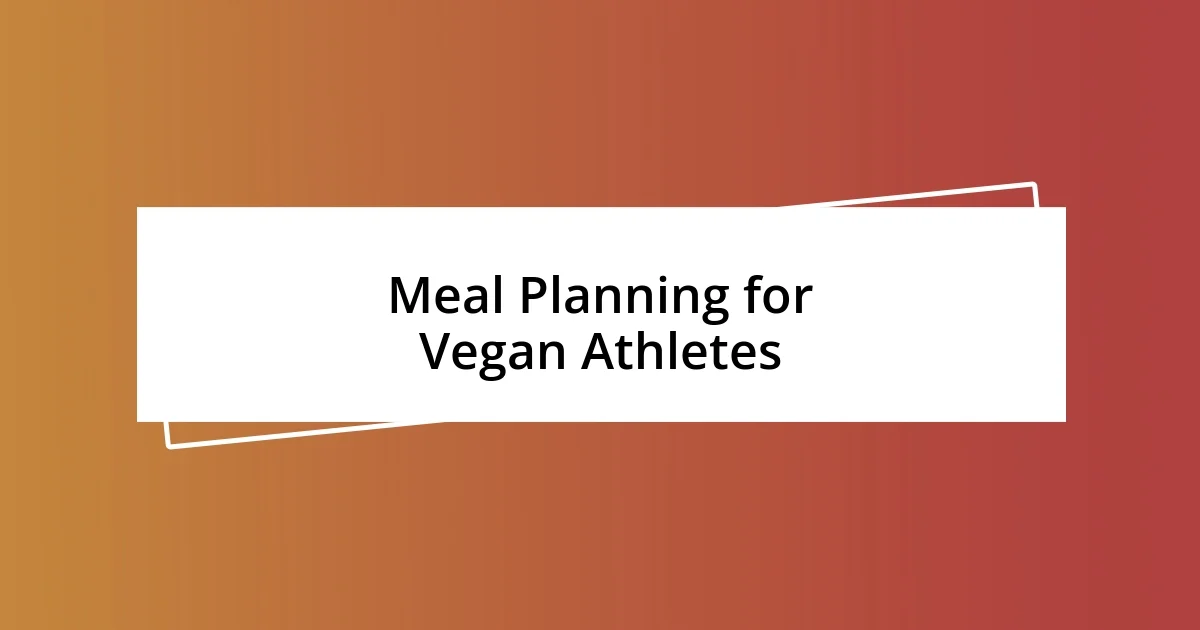
Meal Planning for Vegan Athletes
Meal planning is a game changer for vegan athletes like myself. I remember how daunting it was to figure out what to eat, especially around intense training weeks. However, with a bit of structure, it became a fun science experiment! I jot down my weekly meals, ensuring a rainbow of foods to keep my nutrients balanced and energy up. Trust me; having a plan alleviates the post-workout scramble of figuring out what’s for dinner.
Here are some practical tips I’ve found useful while planning meals:
- Batch Cooking: Preparing large quantities of grains and legumes saves time and helps streamline your week.
- Versatile Ingredients: Choose ingredients that work in multiple meals, like quinoa, which can be a base for salads, stir-fries, or bowls.
- Snack Smart: Don’t forget to incorporate healthy snacks, such as hummus and veggies or nut butter with fruit, to sustain energy levels between meals.
- Prep Ahead: Chop veggies and pre-cook proteins so they’re ready when hunger strikes—this keeps you from reaching for less nutritious options.
- Stay Inspired: I love exploring new recipes each week; it keeps my meals exciting and helps me discover nutrient-dense foods I may have overlooked.
It’s fascinating how meal planning can transform not just physical performance but mental clarity as well. On days when I’ve meticulously laid out my meals, I feel a sense of calm and control. I vividly recall one particularly grueling week when I prepped an energizing lentil salad with roasted sweet potatoes and kale. Each bite felt like a celebration of my hard work, empowering me to crush my training goals. Thinking about what I eat becomes so much more than just maintaining my strength; it’s about fueling my passion and ambition.
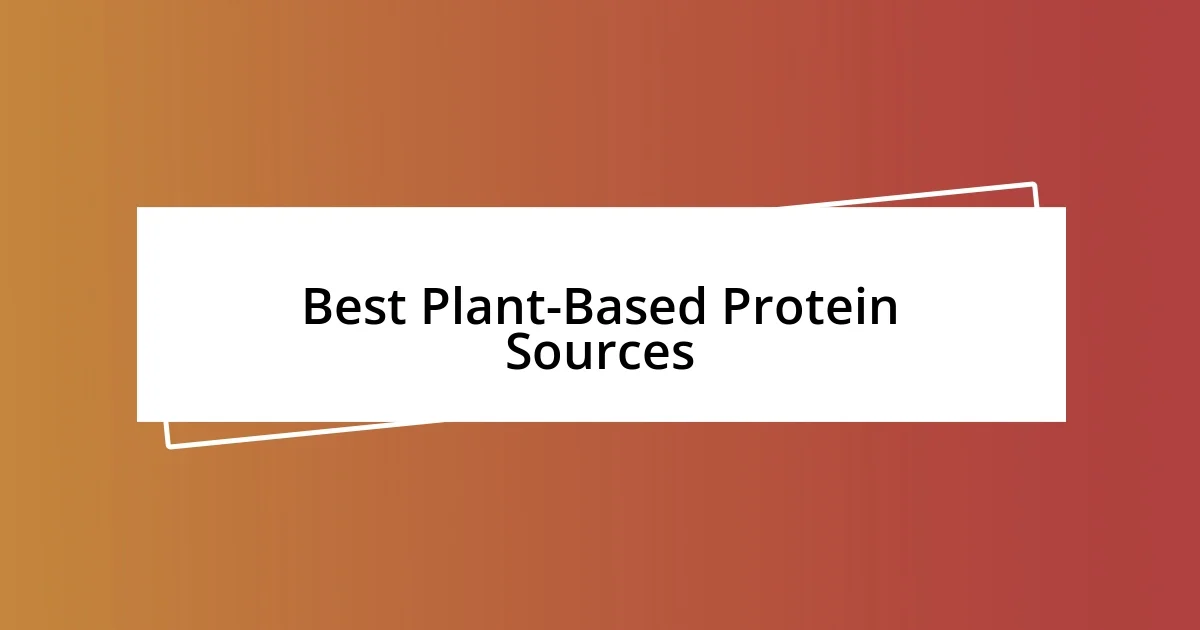
Best Plant-Based Protein Sources
When it comes to the best plant-based protein sources, legumes are always at the top of my list. Not only are they incredibly versatile, but they also pack a punch with protein and fiber that keeps me satisfied after a tough workout. Just the other day, I whipped up a lentil soup that was both filling and nourishing, reminding me how essential these little legumes are for my recovery.
Quinoa is another favorite of mine. This ancient grain is not only a complete protein, meaning it contains all nine essential amino acids, but it also adds a delightful texture to any dish. I love to toss quinoa into salads or bowl combinations for that extra boost. Have you ever tried a quinoa salad with black beans and a zesty lime dressing? It’s a game changer! For me, it feels like a celebration of flavors that fuels my energy.
Lastly, I can’t overlook tempeh and tofu when discussing plant-based proteins. Their adaptability in recipes is second to none. I remember experimenting with a spicy stir-fry that included both tempeh and assorted veggies; the satisfaction of that meal was immense. Each bite offered not just protein but a hearty dose of nutrients. If you haven’t explored the world of tofu scrambles yet, let me tell you, it’s a delicious way to start your day strong. What have you been waiting for?
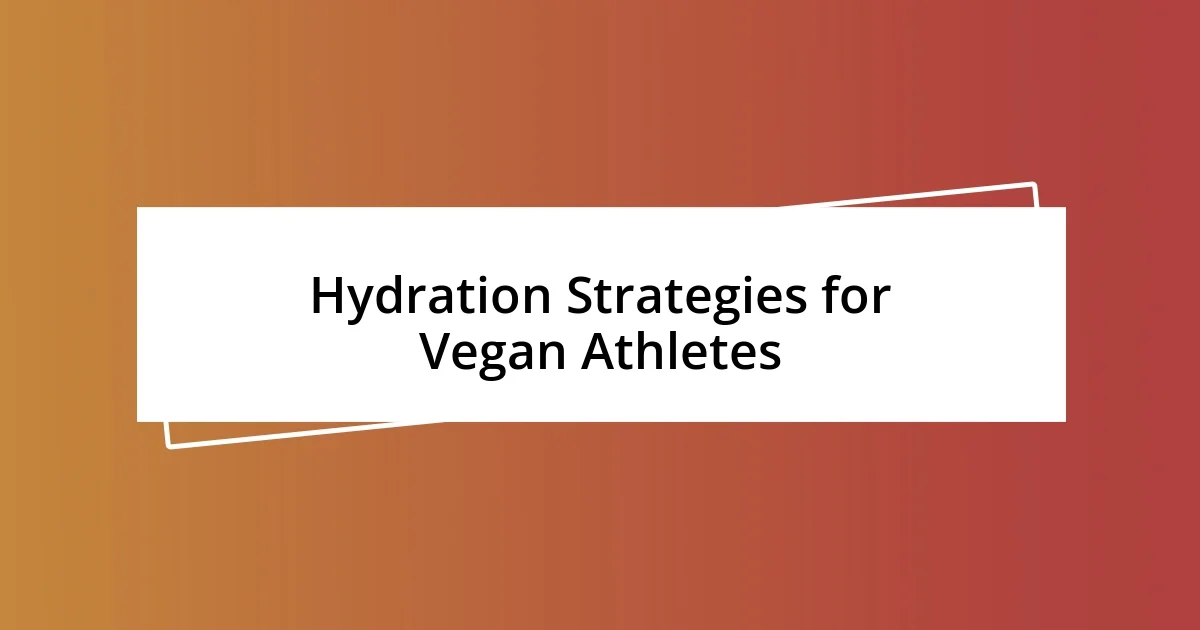
Hydration Strategies for Vegan Athletes
Hydration is a vital aspect of peak performance for any athlete, and as a vegan, I find that my approach to it can be unique. For me, it’s not just about drinking water but also incorporating hydrating foods into my diet. I love snacking on juicy watermelon or munching on cucumber slices before a workout; they not only quench my thirst but also provide essential nutrients that support my overall hydration. Have you ever noticed how certain fruits can feel like a refreshing splash compared to plain water?
I’ve learned that timing is crucial when it comes to hydration. Before an intense training session, I make it a point to hydrate adequately rather than waiting until I feel thirsty. I often fill up on coconut water for its natural electrolytes and light sweetness—it’s become a staple for me. What’s fascinating is that this small habit not only helps me avoid dehydration but also enhances my endurance and energy levels during workouts. It’s a simple yet effective strategy that I swear by!
Post-workout, I pay close attention to replenishing lost fluids. I usually reach for smoothies, blending almond milk with spinach and a banana, which helps restore hydration while providing a nutrient boost. The silky texture and the natural sweetness really make it feel like a treat after a hard session! Have you ever tried hydrating through your meals? It’s not just a drink; it’s a whole experience, and I find it helps me recover faster, fueling my body for what’s next.
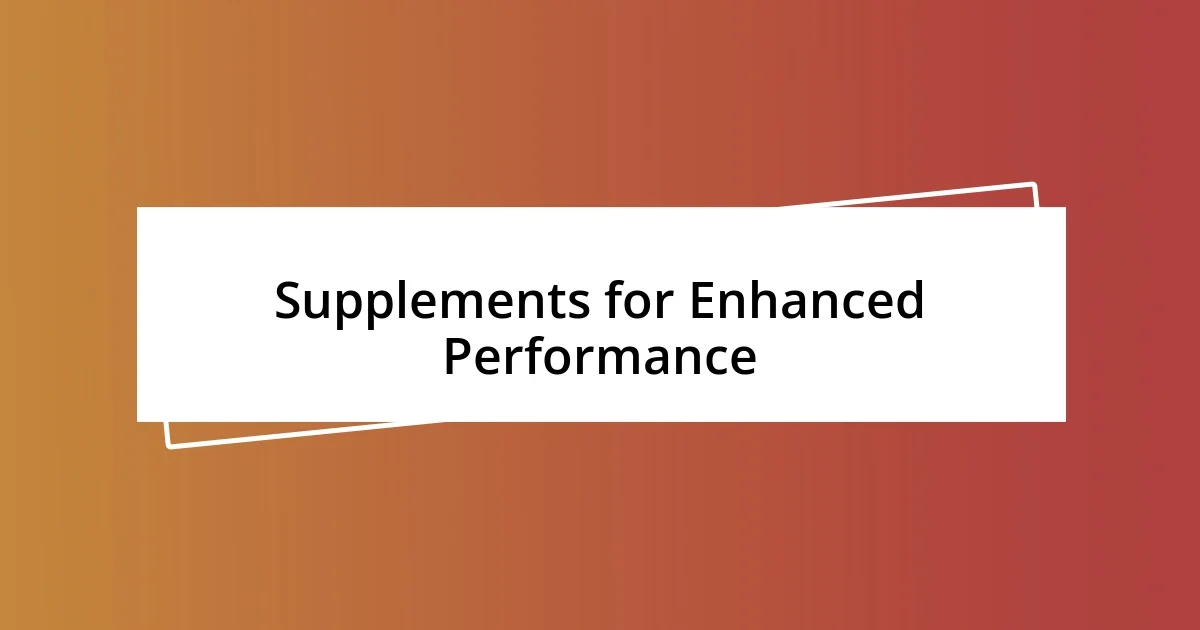
Supplements for Enhanced Performance
When it comes to enhancing performance, I can’t stress enough the role of supplements. For instance, I’ve found that adding a quality plant-based protein powder can make a difference, especially on days when I’m short on time. It’s a quick and easy way to ensure I’m getting enough protein to repair muscles after a workout. Have you tried mixing your protein powder into overnight oats? It transforms a simple breakfast into a powerhouse meal!
Omega-3 supplements have also become a staple for me. As a vegan, I’ve learned that getting adequate omega-3s can be a bit tricky, but adding a flaxseed or algal oil supplement has been a game changer. I remember noticing improved joint health and reduced soreness after starting them. It’s like my body thanked me for providing those vital nutrients. Have you ever experienced that kind of relief after making a simple switch in your nutrition routine?
Lastly, I’ve taken to experimenting with BCAAs (branched-chain amino acids) during my workouts. I typically mix them into my water bottle for a refreshing boost as I train. The first time I tried this, I was amazed at how energized I felt throughout my session. It was like flipping a switch! Finding the right balance in my supplement intake has not only optimized my recovery but made my workouts feel more enjoyable. Have you explored the world of BCAAs yet? They might just surprise you with their benefits.
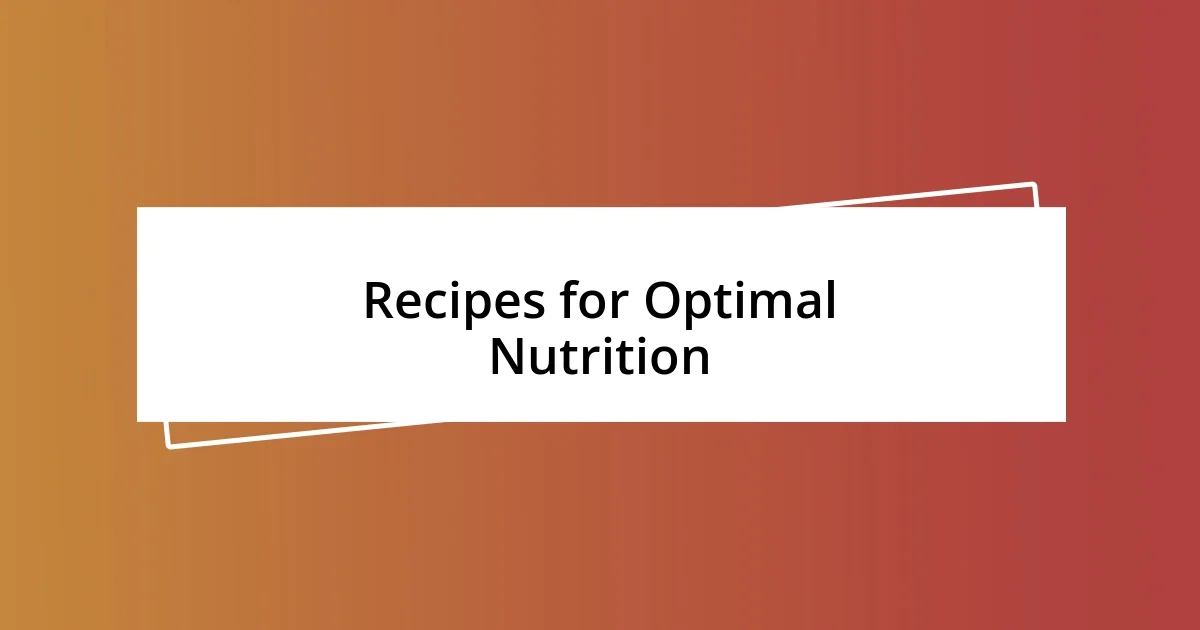
Recipes for Optimal Nutrition
One of my favorite recipes for optimal nutrition is a nourishing quinoa salad that’s packed with flavor and energy. I cook quinoa in vegetable broth for added taste and mix in black beans, diced bell peppers, and a handful of fresh cilantro. The vibrant colors always lift my spirits, and I find that this dish provides a great balance of protein, fiber, and complex carbs to sustain me through a long training session. Have you ever felt the joy of eating a meal that not only fuels your body but also lifts your mood?
Another go-to for me is a hearty chickpea curry, which I love making on chilly evenings. I sauté onions and garlic, then add the chickpeas, diced tomatoes, and a variety of spices like turmeric and cumin. The delightful aroma fills my kitchen, and as it simmers, I savor the anticipation. When I serve it over brown rice or with whole-grain naan, I know I’m giving my body the nutrients it craves, while the complex flavors delight my taste buds. Isn’t it exciting how cooking can be both a nourishing act and a creative outlet?
For a quick snack, I turn to my homemade energy bites, made with oats, nut butter, and a splash of maple syrup. I usually throw in some chia seeds for an omega-3 boost. I remember the first time I took these to a training camp; my fellow athletes were noticeably intrigued and ended up asking for the recipe! Each bite offers a perfect blend of protein and healthy fats, and they keep me energized throughout the day—all while satisfying my sweet tooth. Have you discovered how easy it can be to prepare delicious, nutritious snacks that everyone loves?












